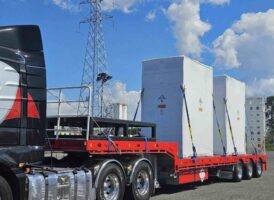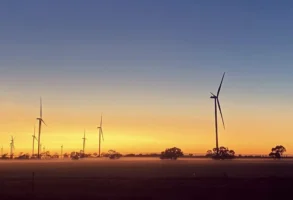Origin Energy says it is close to “pulling the trigger” on its first big battery storage projects after declaring a massive $2.3 billion loss for the latest year and joining other incumbent energy companies bruised by the impacts of the accelerating energy transition.
Origin CEO Frank Calabria told an analyst market briefing on Thursday that it has several big battery storage projects in the pipeline, including at the site of the Eraring coal generator in NSW, where the states government’s targets for 2,000MW of new storage capacity could be key.
“We certainly have been very close to pulling a trigger,” Calabria told the briefing.
“You do want to make sure that when you’re getting into these things, they generally are supported by a revenue stream of some form. And if we looked at New South Wales, you’d clearly be looking to that (state renewable infrastructure) roadmap as the basis upon which you’d enter into them.
“It’s just all timeliness right now, and we’ve got a number of sites ready to go,” Calabria added.
Origin has already flagged plans for a 700MW big battery project that would be co-located at the site of its Eraring coal fired power station in the Hunter region that it plans to close by 2032.
It is also looking at a 300MW combined solar and battery storage facility at Morgans in South Australia, and is mulling a big battery next to its Mortlake power station in Victoria, amongst others.
Calabria also said Origin is looking at opportunities for renewable hydrogen, pointing to growing demand from its customer base.
“We will grow through accelerating what we call renewables and clean energy. And that really means that the introduction of renewables and storage, which will be linked to policies like the New South Wales roadmap.” Calabria said.
“We have to do that in a way that continues to move the business forward and at the same time pursuing investments in opportunities like hydrogen and ammonia, which we continue to advance.”
“We do think about it all being driven by customers, increasingly,” Calabria added.
The future of Origin’s 2,880MW coal-fired Eraring power station continues to loom large as a challenge for the company.
The power station is scheduled to begin decommissioning of its generation units from 2030, but the company has flagged that the growth of lower cost supplies of wind and solar power is eroding the power station’s financial viability.
Origin is looking to operate the Eraring plant ‘more flexibly’, taking advantage of higher price events in the market and limiting its operation during periods when wholesale electricity prices fell below Eraring’s generation costs.
Origin has also noted that Eraring will help the company meet its obligations as an electricity retailer under measures that include the Retailer Reliability Obligation, and would almost certainly benefit from a potential Physical Retailer Reliability Obligation being proposed by the Energy Security Board.
The controversial Physical Retailer Reliability Obligation has been embraced by the Morrison government as a way to keep ageing coal fired generators operating for longer.
Many energy market incumbents – including Origin Energy – have given it a lukewarm welcome, suggesting that the focus should still be on facilitating a transition away from an aging thermal generation fleet to clean energy technologies and flexible capacity.
Origin’s $2.3 billion loss for the 2020-21 financial year was the result of falling wholesale electricity prices, the rising cost of gas, and write downs that include renewable energy purchase agreements that have locked Origin Energy into paying above market prices for supplies of electricity and renewable energy certificates.
Interestingly – while only playing a minor part in Origin Energy’s overall financial results – Origin said that it would secure a $50 million financial benefit by delaying its compliance under the federal Renewable Energy Target.
Origin said that it would take advantage of a controversial and now disallowed three-year window during which it could delay the surrender of Large-scale Generation Certificates under the federal RET.
Because the price of certificates is expected to fall over the period, Origin said it would save $50 million in certificate costs by waiting to buy them until the last possible moment.
The result, however, of this mechanism – which is also used by other big retailers – is that some wind and solar projects have been delayed. In the case of Origin, it could also a benefit of the major delay to the 530MW Stockyard Hill wind farm, which is the biggest in the country and was to provide the bulk of its LGCs.
Origin’s loss follows the $2 billion loss recorded by AGL Energy last week, with Australia’s major electricity companies forced to navigate a difficult period for large energy market players in a market undergoing a significant transition away from coal and gas to renewables and storage.










